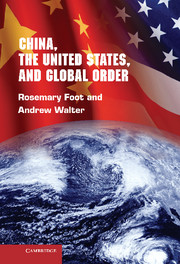7 - Conclusion
Behavioural Consistency and Its Implications for Global Order
Published online by Cambridge University Press: 05 June 2012
Summary
This final chapter draws together our findings across the five issue areas, so as to determine the role that both China and the United States play in relation to global order. The first part provides a brief overview of the levels of behavioural consistency across the five global normative frameworks. The second part discusses how levels of behavioural consistency are best explained. The third part addresses the implications of our empirical findings and our analytical framework for the scholarly debate on norms and actor behaviour. The fourth and final part assesses the implications of our analysis for our understanding of the contemporary global order and its prospects.
Main Findings on Levels of Behavioural Consistency
Summarizing the main patterns of behavioural consistency is not straightforward given the complex and often substantial variations that we have described in the preceding five chapters. In order to identify the most important patterns in this complex picture, we outline here broad behavioural patterns first by country and second across issue areas. It should be emphasized that in this section we put to one side the often considerable level of domestic debate and contestation regarding national policy choices as well as many of the nuances of national behaviour. Our main goal is to generalize about dominant behavioural tendencies rather than to return to the complexities of national policy choices that received more attention in the previous five chapters. We do, however, return to this domestic contestation in the next section. Table 7.1 provides a summary of these dominant behavioural patterns for each of our five issue areas. It reveals a very mixed picture for both countries.
- Type
- Chapter
- Information
- China, the United States, and Global Order , pp. 274 - 302Publisher: Cambridge University PressPrint publication year: 2010

